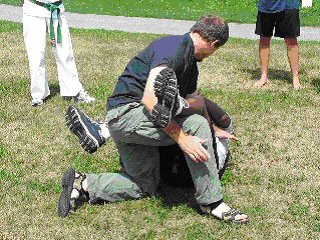Here’s the second part of the interview with Rory Miller. Enjoy!
Q: You worked as a corrections officer for a long time. Why did you decide to take on that job?
A: Uh, just married and a baby on the way and I desperately needed a real job. It turned out to be one of the best jobs ever. There is nothing else that takes everything you have- every shred of knowledge, every iota of communication skill and psychology and sometimes fighting and lays it on the line like Corrections.
Here’s the basic job for a rookie: you are unarmed, just a set of keys and a radio. No armor, no partner. You will be locked in a room of 32 very bad guys (murderers, some multiple, rapists, serious multiple assaults) or 75 bad guys (assaults and rapes, some murders, drug dealers with gang ties….) or 190 not-so-bad-guys (drunk drivers, minor assaults, drug dealers and burglars).
You will feed them, get them medical attention, ensure their rights are respected and keep them from preying on each other. You will learn more about power psychology and group dynamics than a psychology professor could ever dream. You will talk down more crazy, violent people in a bad month than most Hostage Negotiators do in a year. There is no piece of information so trivial that you might not have a chance to use it to start a conversation, and talking is always better than fighting. All of this outnumbered thirty to one by people that will start off hating you until you earn their respect.
Q: What is the most common misconception the average person has regarding correctional facilities?
A: Almost everything everyone knows is a myth. It’s nothing like “Oz” or “Brubaker” or “Cool Hand Luke”. The officers are the good guys. Jails tend to be pretty clean. A lot of work goes into protecting the inmate’s rights and assuring their health and welfare.
Q: Are there things these series and movies do get right?
A: No, not really. That’s too harsh. Most of the shows have one truly evil criminal and one truly manipulative criminal. Combine them into a single character and you get pretty close to the average violent criminal. BUT everyone, inmates and officers alike, have a stake in the facility running smoothly. Some, maybe most, inmates find a lot of comfort in the routine of jail or prison. Everyone involved works to make it boring.
Q: What is the most common misconception that same average person has about violence in the correctional environment?
A: That it is common. That a prison or jail is a hotbed of rape run by violent gangs. In a well designed, well-run facility, sexual assault is rare. There is a lot of violence- this is a population that just sees violence as another social tool- but inmates rarely have the privacy for a long, drawn out assault.
Q: How would you compare violence in prison to street violence? Similarities? Differences?
A: The kind of people who perpetrate it are the same. The situations a predator tries to set up are the same- surprise, weapons, no witnesses (for non-monkey dance attacks). The big difference is the victim pool. In a correctional setting you have a pretty good idea that almost everyone around can be dangerous and on some level most of the people there are prepared for that. In the street, a victim who seems prepared gets passed over- so there is more surprise on the street and the person who most needs self-defense is far less likely to be prepared. Generally, if there is good contraband control, there are fewer weapons involved inside than outside and far fewer firearms. Not always, though: shanks are part of the culture and weapons get very common if a facility has poor contraband control.
Also, there are two very different “combat zones” on the inside. Most of what people see on movies is in prison. The inmates have already had their trials, been searched many, many times and are pretty institutionalized. Most of our fights actually happen in booking- someone who has just been arrested, probably still high or drunk, very angry and often not properly searched.
This is where we get the PCP freaks and weapons and stuff. I was told early in my career that two years working the counter (booking) will get you more hand to hand experience than a road officer would get in his career. I’ve taught a class of enforcement with two other corrections guys. There was 180 years of law enforcement experience in the students. Each of the instructors had more uses of force than all of the students combined.
Q: How did you come about writing Meditations on Violence? Did you always have the idea in mind or did your experiences just come together and culminate in the book?
A: I blame Kris Wilder. He got me started teaching at one of his seminars, Martial University, and it was really clear that martial artists didn’t think about violence the way that I did. They were willing to believe something was effective no matter how patently absurd it is (12 pounds of pressure will snap a collar bone, for instance). I have to bet my life or, as a teacher, a rookie’s life on what we do. They trained for attacks that were easy, not the kind of attacks that really happen.
When I started talking about it, it was really clear that people were training in SD without any idea whatsoever of how attacks happen. They were training hard but they weren’t training for anything that actually existed. So I wrote a short pamphlet for the seminars, “The Rhinoceros and the Unicorn” purely to save me some time by trying to establish a common vocabulary. Then, in 2002 a lot of very bad shit happened and I started writing to get it out of my head. “Meditations on Violence” is from those two things coming together.
Q: Which message do you want readers of the book to take to heart the most?
A: Just one? Grumble grumble… You are responsible for your own safety. Not your sensei, not your mommy. If your ass is ever in deep shit, they will not be there, you will. Get the best information from the best sources you can and do not disregard it because it is not pretty. Or go ahead and disregard it but don’t be coming whining to me.
Q: OK, anything else you’d like to add?
A: Learn how attacks happen. Too many people train like they are collecting tools. Mechanics don’t study tools, they study cars and what can go wrong with them. Doctors don’t take classes on Scalpel 101, they study diagnostics and anatomy. If you want to defend yourself, learn about violence. It is useless to have a thousand answers if you don’t know the question. Also, be prepared that your idea of who you are probably won’t survive a violent encounter.
Q: The reception of your book has been phenomenal. Do you have another one or any other projects in the works?
A: I’m supposed to sound all excited in interviews, but writing can be really aggravating. I’m working on two. “Principles and Concepts” will cover the principles that make a technique work under real conditions and how people who deal with violence professionally think about it.
The other is a Citizen’s Guide on police force. Whenever a use of force hits the news, people come out of the woodwork with opinions and judgments. Most have no idea of the laws and policies pertaining to force or the rationale behind using force at all. Combined with the fact that most people have a completely Hollywood idea of violence, some of the loudest critics are completely without information. I want a book for them that covers both how officers are trained in making force decisions and how their experiences in real life affect and change officers.
Q: Those two sound real interesting. Do you have a deadline or target date in mind?
A: Ideally I’d like to have the Citizen’s Guide ready for a publisher by June. I could get P&C done on the same timeline, but that one is going to take a lot of illustrations and I’m not in a place that I can do that right now. Fall would be good.
That’s it for the interview. Special thanks to Rory for making time for answering the Qs. If you have any comments, feel free to leave some here.
UPDATE: Check out my review of “Meditations on Violence”.
.




Neal Martin says
I enjoyed reading your interview with Rory Miller. I have read his book and he knows his stuff, no doubt about it. He lives and breathes what he does and more importantly, he has put a lot of thought into what he teaches.
The only thing I will say is that you have to be careful not to get too obsessed with the whole idea of violence. I think if you dwell too much on violence, especially the idea of it happening to you, then you end up attracting it into your life whether you want to or not and that’s not always a good thing. It’s up to the individual I suppose. Sometimes the only way to test yourself and your techniques is to seek out confrontation in some way, like through bouncing or something. You go down that road however and you find yourself staring into the abyss. You just have to be careful you don’t fall in.
Anyway, good site and good articles.
Neal Martin says
I enjoyed reading your interview with Rory Miller. I have read his book and he knows his stuff, no doubt about it. He lives and breathes what he does and more importantly, he has put a lot of thought into what he teaches.
The only thing I will say is that you have to be careful not to get too obsessed with the whole idea of violence. I think if you dwell too much on violence, especially the idea of it happening to you, then you end up attracting it into your life whether you want to or not and that’s not always a good thing. It’s up to the individual I suppose. Sometimes the only way to test yourself and your techniques is to seek out confrontation in some way, like through bouncing or something. You go down that road however and you find yourself staring into the abyss. You just have to be careful you don’t fall in.
Anyway, good site and good articles.
Wim says
I totally agree. Violence is an integral part of life but for the average civilian, it shouldn’t be the most important part. If it is, you’ll come to the edge of that abyss pretty fast indeed. And nothing good ever comes out of it.
Thanks for stopping by and commenting Neal.